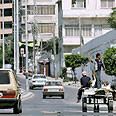

My friend and neighbor in Gaza City, B., is a brilliant, ambitious young woman. After years of exile in Syria, B. was able to obtain a permit and eventually ID card that allowed her family to return to Gaza in the mid 1990s.
A 30-year-old civil engineer involved in some of Gaza's top projects, she was recently accepted to pursue her Masters degree at Bir Zeit University. Several paid semesters later she had to withdraw her standing because she was continuously denied a travel permit based on "security reasons" to the West Bank by the Israeli government.
Now, B. confesses, she feels as though she went from living in one prison on the outside, unable to live in her homeland, to another internal prison in her own home, unable to move, study or visit her sister in the West Bank.
B. is not alone, of course, nor does her story represent a particularly glaring example of the effects of Israeli border closures. Her 45-year-old neighbor became blind waiting for his permit to be approved-one that would have allowed him to be treated in a Jerusalem hospital.
What it does demonstrate is how far-reaching and invasive the consequences can be, affecting even seemingly banal aspects of Palestinian life, rendering routine matters utterly impossible.
Highest-security open-air prison on earth
Today Gaza faces one of the most brutal military sieges in recent memory. Which begs the question: What does a lot of red tape have to do with the current crisis?
Last August, Israel withdrew its troops and settlers from the Gaza Strip. The world rejoiced, rushing to declare that Gaza was now “free.” So why is it that Palestinians are not satisfied, we hear time and again?
Why, almost a year on, would they capture an Israeli soldier, and continue to fire homemade rockets into Israeli towns when they could have, built a better life for themselves?
To say that Gaza is now under siege, despite how bad things are, is to presume that things were relatively normal before.
The reality is that Gaza has been under effective Israeli siege for over a decade now, subject to the merciless grip of a complex Israeli matrix of administrative control that seeps into and affects every aspect of our lives.
Only several months on from the Disengagement, Gaza resembled little more than the largest, highest-security open-air prison on earth.
Impermeable barrier
It soon became apparent - long before Hamas was elected into power - that the Israeli occupation of Gaza had not ended. It had just become more sophisticated and entrenched: Gaza's skies, borders, air, travel permit system, and birth registration process all remained under Israeli control.
The intoxicating sense of freedom we felt during the days after the last of the Israeli settlers departed dissipated nearly as quickly as it has descended upon us. And though internal barriers and checkpoints were lifted, there existed a larger, seemingly impermeable barrier surrounding every aspect of our lives.
Israel continued to impose a blanket travel ban to the West Bank and Jerusalem on over 90 percent of Palestinians in Gaza, and particularly on those between 16 and 35 years of age.
Even Palestinian control over the dreaded Rafah Crossing-Gaza's only route to the outside world, turned out to be ultimately fictitious, with Israel effectively controlling who uses the crossing (only Palestinian ID card holders have so far been allowed in).
Israel also continued its freeze on the issuance of more than 50, 000 Palestinian identification cards and family re-unification permits that would have allowed Palestinians couples to join their spouses and travel freely in and out of Gaza.
My husband, the refugee
My husband, a Palestinian refugee who grew up in Lebanon's refugee camps after his family was forced out of Haifa in 1948, is still forbidden from visiting or residing with me and our son Yousuf when we are in Gaza, let alone return to his native home.
Yassine, now a Harvard educated physician specializing in the United States, is still without any citizenship or country that he can claim as his own, and is unable to reside legally with his family in his own country.
These and other restrictive Israeli policies were in place well before Hamas' election victory, and in fact may have contributed to it. They also help explain why Palestinians have not overwhelmingly demanded the release of the captured Israeli soldier, despite the consequences they have bore as a result.
Hell on earth
But Israel, and the outside world, it seemed, had had enough with Gaza. It was behind them now, a done deal; Israel had "withdrawn", and in the end, that is all that mattered: what more did Palestinians want?
The feeling amongst Palestinians is that Gaza had been left to the wolves. Never mind the lack of freedom, of sovereignty of any semblance of statehood or territorial contiguity.
Gaza was for Palestinians to deal with now, no matter that almost every aspect of it was still controlled by an outside force that no longer assumed responsibility for the welfare of the people it still occupied.
Gaza had become hell on earth, its inhabitants surrounded from all sides, deprived of their most basic freedoms, completely bereft of their rights and their sovereignty, and yet somehow expected to bow in submission and accept their fate.
To be free
It is at all surprising, then, that a recent poll showed the striking majority of Palestinians are in favor of solving the problem of the Israeli captive for something in return?
Perhaps what many would find surprising was that as of late July 2006 65 percent of Palestinians, in varying degrees, were in favor of resuming the peace negotiations with Israel, given the opportunity.
But the way Palestinians see it, instead of offering a hand, Israel has bombarded our cities, withheld our aid, and closed our borders, citing the lack of a negotiating partner on the Palestinian side, no matter who was in power on that side.
While covering the collapse of the Rafah wall last September, I noticed two young Palestinian boys, no older than 9, who were peering curiously over part of the fence that had for so long divided them from their sister city on the Egyptian side.
I asked what they were doing. They told me they had never set foot outside of Rafah in their entire short lives. They wanted to see what this world - and its inhabitants - looked like. It was a sobering reminder of how secluded Gaza had become.
And it also served to remind that in the end, Palestinians only desire what any other people desire: to live, and to be free.
In the end, the lesson to be taken when and if this most recent "escalation" is over and done with is that the policy of unilateralism can never succeed in achieving a just and secure peace.
Israel's ongoing war practices against the Palestinians - whether by way of extra-judicial assassinations, the grossly disproportionate artillery strikes against civilian populations in northern Gaza, or the continued asphyxiation of the economy and the people through economic and political blockades and border closures - all of which predate the democratic election of the current Hamas-run government-will not solve anything.
It will only spur further retaliations, result in more bloodshed of innocent civilian lives, and perpetuate the conflict. Only through fully ending their occupation of the West Bank and Gaza can a lasting peace be achieved.
Laila M. El-Haddad is a journalist who lived in the Gaza Strip and author of the blog Raising Yousuf















